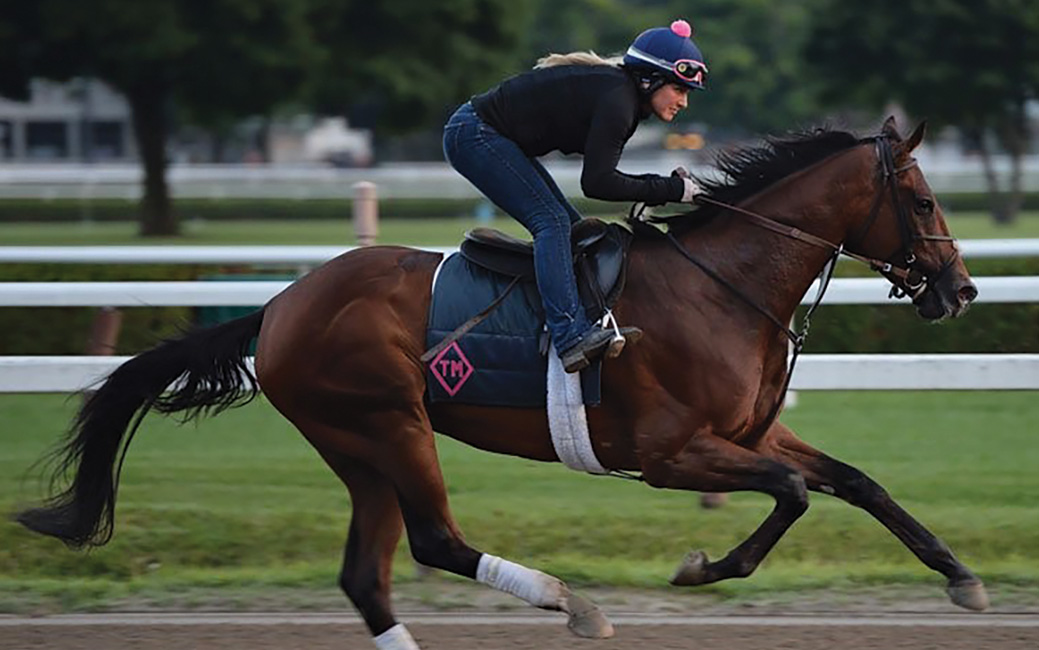The Sport of Queens
Maggie Wolfendale ’09 and Gabby Gaudet ’13 have reached the top tier of horseracing media.
By Chandler Vicchio

Long before Maggie Wolfendale ’09 appeared on television as a paddock analyst for the New York Racing Association (NYRA), she knew she wanted a career involving horses. As a third-generation horsewoman, she grew up surrounded by them. Her grandfathers owned horses, and her maternal grandfather was a trainer, a jock’s agent and clerk of scales, among other racing-related professions. Her father was a trainer and met her mother when she was riding horses as a teenager.
Wolfendale isn’t the only TU alum covering the upper echelon of horseracing. Gabby Gaudet ’13 is a racing analyst for TVG Network and commentator for Keeneland racing coverage, which is based in Lexington, Kentucky. Wolfendale and Gaudet have commanded the spotlight in an industry where women have traditionally held supporting roles, and they continue to pave the way for seating more women at the table in the future.
Wolfendale spent much of her childhood in the barn. She had her own pony by the age of 2 and developed a passion for retiring and retraining racehorses by the time she was 10 or 11. Although she owned a few show horses in her adolescence, she jokes that to be successful in that arena, a person needs to be really wealthy or really good—neither of which she felt applied to her. So she set her sights on the racetrack as a better path to her ideal career.

“When I was growing up,” she says, “I’d watch a lot of the on-air handicappers and found that I was pretty proficient at writing and speaking in front of people, so I married the two when I got to college.”
At TU, Wolfendale majored in mass communication, tailoring her degree for a future in broadcasting. She interned with the Maryland Jockey Club at Laurel Park and Pimlico race courses, and upon graduating, she sent a reel and resume to every racetrack in the country, as well as two TV networks.
“I consider myself bold but also lucky,” she says of the decision, which resulted in a call from the NYRA—the organization operating the three largest thoroughbred racetracks in New York—expressing serious interest. Renowned handicapper Andy Serling was looking for someone to provide analysis from the paddock to complement his analysis in the anchor’s chair, an undertaking that came naturally to Wolfendale.
“Assessing horses and how they look physically and how they are suited to a certain condition of a race or just how they are doing in general was very easy for me,” she says. “It was a nice step into what I do now.”
Today Wolfendale is still primarily a paddock analyst for the NYRA, but her platform has grown tremendously. After the NYRA partnered with Fox Sports in 2016, simulcast coverage evolved into televised shows like America’s Day at the Races, Saratoga Live and other specials airing on FS1, FS2 and Fox. And beyond the paddock, you might find Wolfendale playing the role of anchor or color analyst or even riding on horseback interviewing a jockey right after a big win.
Although Gaudet shares many similarities with Wolfendale in terms of upbringing, her path to the paddock is uniquely hers. Gaudet is a second-generation horsewoman. Her dad was a trainer, and her mom was his partner, taking care of the billing and business aspects of his work.
Her sister knew at a young age she wanted to be a trainer, but Gaudet didn’t have the same aspirations. Despite riding horses every morning and growing up immersed in the sport, she entered TU as a double major in mass communication and art + design, intending to become a graphic designer at an ad agency after graduation.
“I didn’t take any media classes,” she says. “In fact, I can remember taking a public speaking class, and I was nervous for weeks.”
But Gaudet knew Maryland Horse Radio host Stan Salter, and she tried some radio work while at TU, which planted a seed for broadcasting. She appeared on Inside PressBox with Stan “the Fan” Charles a couple times a year and made some connections in local TV. Her senior year she was approached by Frank Carulli, an on-air handicapper who worked at the Maryland Jockey Club, who asked her if she had any interest in being on television.
Although she had never considered the idea, the offer piqued her interest. “I loved
the sport; I knew I wasn’t going to work with horses every day, that I wasn’t going
to wake up at four in
the morning to go out to the barn,” she says. But she realized broadcasting offered
a “whole new side to the sport, which was challenging and interesting.”
After auditioning alongside two other aspiring broadcasters, Gaudet was offered a full-time position replacing Carulli, who was retiring. She remembers how her first week on the job coincided with finals and Preakness. “I don’t know how I got through it,” she says.
Since then, horseracing has taken Gaudet around the country and the world—including trips to Canada, England, New Zealand and Hong Kong.
“ I didn’t take any media classes,” she says. “In fact, I can remember taking a public speaking class, and I was nervous for weeks. ”
While Wolfendale and Gaudet continue to excel in their field, they have done so while balancing a demanding career and raising a family. Wolfendale is married to trainer Tom Morely, and the couple have two daughters, 5-year-old Grace and 2-year-old Willow. Gaudet married trainer Norm Casse, and they have a son, Crew, who will turn 1 in November.
Wolfendale admits it’s not the easiest job to have, especially working weekends while raising small children. Working summers at the track until 6:30 or 7 p.m. often results in missed family dinners and less time in the barn, where she loves to gallop horses in the morning.
On the flip side, being a horse family has its advantages, like spending summers together in Saratoga Springs, New York.
Being a team on the track has also made some of Wolfendale’s professional experiences more meaningful. When her husband won his first Grade 1 race in 2016, she was pregnant with their first child.
“You can hear me screaming over the call of that race because I was standing underneath the announcer’s booth on the apron,” she says, remembering the flood of emotion she felt.

Two years later, a Morely-trained filly, La Moneda, won the Yaddo Stakes at Saratoga
Race Course, and not only did Wolfendale interview the winning jockey on horseback
after the victory, she also did so on her favorite horse, Yeager, a thoroughbred her
husband trained and she retrained to do television work. Once the interview ended,
she rode to the winner’s circle to share the experience with her family. A photograph
capturing the moment—with her helmet on, microphone in hand and daughter Grace in
her arms—is displayed in her home today.
Perhaps another reason those moments felt so special is she grew up watching horseracing broadcasting pioneers like Charlsie Cantey and Donna Brothers, while picturing herself in their position.
“I remember [thinking], ‘That is what I want to do,’ and the fact I get to do it now is kind of like my corny dream come true,” she says.
Whereas Wolfendale covers year-round racing based in New York, Gaudet lives in Louisville, Kentucky, where racing is seasonal. As a result, her family must travel part of the year. Just how much depends on where she is assigned and where her husband is training horses, which changes periodically. This past summer she spent six weeks in San Diego, California.
“It’s a very unusual industry,” Gaudet says. “It’s not like you leave for a weekend, and then you’ll come back home. You leave for sometimes weeks or months on end, you have to find babysitters all throughout the country and you just have to make arrangements.”

Leaning on other working women in the industry and reminding herself of the positives has helped Gaudet navigate the challenges of being a new mom. “We really do try to make the most of it wherever we have to go,” she says. “I always think it’s a blessing that we get paid to go to all these amazing places and cover horseracing.”
Gaudet says she often pinches herself when she thinks about all the incredible things she has experienced while covering the sport—whether it’s little moments, like seeing her name on a dressing room star at the Fox studio in Los Angeles, or bigger ones, like being the first woman to announce a major thoroughbred sale in North America. Once, she unexpectedly saw herself in a Women in Racing exhibit at the National Museum of Racing and Hall of Fame in Saratoga Springs while visiting to check out its new 360° immersive theater with her husband.
But her favorite moment might have been when she was asked to host the Eclipse Awards—the Academy Awards of horseracing. Gaudet recalls being nervous at the event years prior because she was presenting one of the awards. Going from anxious presenter to confident host a few years later was a special milestone and reminder of just how far she has come.
When thinking back on their time at TU, Wolfendale and Gaudet can pinpoint elements that helped build a foundation for their successful careers today. For Wolfendale, it was broadcasting classes that required her to write two- to three-minute features because it taught her a lot about shooting and writing scripts.
“ I remember [thinking], ‘That is what I want to do,’ and the fact I get to do it now is kind of like my corny dream come true, ”
Although Gaudet didn’t pursue broadcasting in her studies, she says her art classes helped her television work by teaching her to tap into her creativity, and studying abroad gave her the confidence to take chances and try broadcasting in the first place.
Chance plays a huge role in horseracing, and, while a lot of numbers and strategy go into making predictions, Gaudet has simple advice for newcomers to the track.
“I always tell people to go to the paddock and pick the [horse] that looks the prettiest. I know that sounds silly, but, if you are around animals, you can tell a healthy or happy animal versus a horse that’s a little bit nervous or maybe not having a good day.”
Gaudet and Wolfendale consider themselves analysts far more than gamblers, but, considering their success in the industry, it’s safe to say both bet on themselves and won.
Chandler Vicchio is TU’s assistant director of alumni social media, career and volunteer services. She is pursuing her master’s in professional writing at TU.
